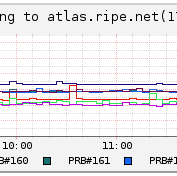
RIPE Atlas User-Defined Measurements Are Here
• 2 min read
RIPE Atlas user-defined measurements are here! Hosts and sponsors can begin creating personalised measurements from probes around the globe.

Articles
Likes on articles

Vesna Manojlovic is Community Builder at RIPE NCC. Vesna joined the RIPE NCC as a Trainer in 1999. In 2003, she took responsibility for developing and delivering advanced courses, such as RPSL, Routing Registry, DNSSEC and IPv6. In 2008, she lead efforts to establish IPv6 RIPEness as a measure of IPv6 deployment among LIRs. In 2011, she joined the Science Division as Manager of the Measurements Community Building team; in 2015 she moved to Communications Department as Senior Community Builder, with a focus on organising hackathons. Vesna gives presentations at many technical conferences and workshops, and enjoys visiting hackerspaces. Vesna received a Batchelor of Sciences Degree in Computer Science and Informatics from the School of Electrical Engineering, University of Belgrade. She has three children.

• 2 min read
RIPE Atlas user-defined measurements are here! Hosts and sponsors can begin creating personalised measurements from probes around the globe.
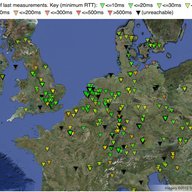
• 2 min read
RIPE Atlas is now accessible for all the RIPE Labs users and LIR Portal users, via "RIPE NCC Access" (single sign on system).
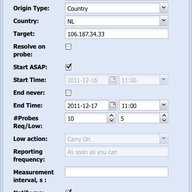
• 6 min read
We started beta-testing User Defined Measurements (UDM) for RIPE Atlas. The first results are encouraging and we are receiving useful feedback from happy users.
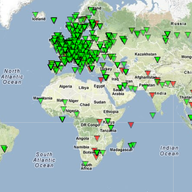
• 2 min read
We are proud to announce that over 1024 RIPE Atlas probes are now active, distributed over the whole world! This is an important milestone. It was one of our goals for 2011, and we achieved it!
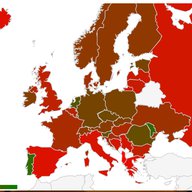
• 4 min read
Following your feedback, we decided to make IPv6 RIPEness a production service. We are currently working on some new features. Stay tuned!
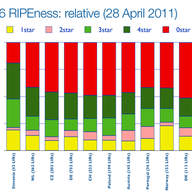
• 6 min read
A year ago we introduced IPv6 RIPEness - a system that rates IPv6 deployment of Local Internet Registries based on certain criteria. It was meant to encourage LIRs to deploy IPv6. Now, one year later, we are proud to present the progress of this project.

• 8 min read
We recently posted an article about IPv6 "RIPEness", a four-star rating system of Local Internet Registry (LIR) IPv6 deployment.

• 6 min read
We looked at all LIRs registerd in the RIPE NCC service region and determined their home country based on their Reg-ID (country-code.name).

• 10 min read
The RIPE community has always aimed to foster an open, supportive atmosphere across its events and communication fora. The RIPE Code of Conduct helps make clear which behaviours cultivate that, and which don't. Here, the RIPE Code of Conduct Team talk about the work they do to help uphold RIPE comm…
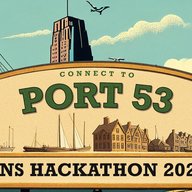
• 7 min read
At the RIPE DNS Hackathon 2023, a group of DNS enthusiasts started writing implementations of the Authenticated DNSSEC Bootstrapping protocol. After the event, the work continued, culminating in the completion of a module for Knot DNS. So what problem does the new feature address, and how can you u…

• 13 min read
ChatGPT and other AI applications such as Midjourney have pushed "Artificial Intelligence" high on the hype cycle. In this article, I want to focus specifically on the energy cost of training and using applications like ChatGPT, what their widespread adoption could mean for global CO₂ emissions, an…
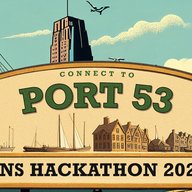
• 10 min read
DNS-OARC, Netnod and the RIPE NCC invite you to join us for our DNS Hackathon in Rotterdam, 20 - 21 May 2023, taking place over the weekend before RIPE 86.
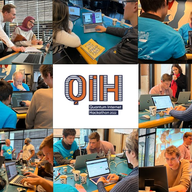
• 3 min read
On 1-2 December 2022, together with the partners, the RIPE NCC organised a Quantum Internet Hackathon in Amsterdam, Dublin, Padua, Poznan, Sarajevo and online! It was great fun to work on the challenges and explore the mysteries of the Quantum Internet.
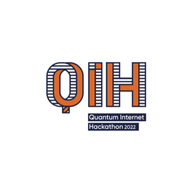
• 7 min read
The RIPE NCC is co-organising a Quantum Internet Hackathon simultaneously in five nodes on 1-2 December 2022. Join us in Amsterdam, Dublin, Padua, Poznan, Sarajevo - and online!

• 9 min read
Choice of communication tools is not usually a topic for RIPE community engineers. This article is aimed at not-so-technical audiences who might need help and support from their IT colleagues during these difficult times.
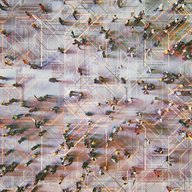
• 8 min read
The RIPE NCC recently held two Open House events to bring together people who help organise NOGs, which bring together people who help operate the Internet in particular parts the world.

• 7 min read
Our cloud strategy framework provides a starting point that we will use when developing cloud implementations in the future. It also forms a solid basis for discussions with the community on specific proposals relating to our services.

• 11 min read
Our draft cloud strategy framework is an attempt to bring everything together in a way that sets out some boundaries, identifies critical elements, and indicates where we need to be strict vs where we can afford to be a little more relaxed. This should hopefully support more clarity regarding how w…
“CAIDA wrote a blog post about the hackathon results: https://blog.caida.org/best_available_data/2016/11/11/the-remote-peering-jedi/”
... and two more mentions: Euro-IX Newsletter http://us7.campaign-archive2.com/?u=99dcdddc67f83b726fa293b31&id=4dcbc6b909&e=c4430325ce & #37 Weekly Internet Infrastructure Updates from Christian Koch: http://us12.campaign-archive1.com/?u=d732e9c6adbea385abc856c8d&id=950ca992ef
CAIDA wrote a blog post about the hackathon results: https://blog.caida.org/best_available_data/2016/11/11/the-remote-peering-jedi/
Geert Jan, thank you for helping us to grow RIPE Atlas in the "not so easy" parts of the world! As for your questions, we considered them, and I would like to separate two aspects: - We are indeed distribute probes (also thanks to ambassadors like you) to all parts of the world. However, probes are still predominantly deployed in the parts of the Internet that is already covered pretty well - maybe that's due to the nature of the ”network effect”. - This specific article was not looking into the numbers of probes that were lost, postponed, or for other reasons *never connected*. All probes in the analysis and the graphs above were connected at some point in their lifetime, and then either continued to live or "died”. We will continue to observe RIPE Atlas probe distribution, deployment and lifetime, and we will publish an update when there are any new developments.
Showing 43 comment(s)